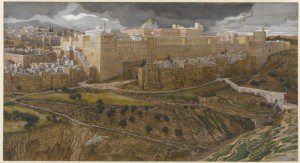
(Click to enlarge.)
I’m sitting between my wife and the notorious John Gee in BYU’s Gordon B. Hinckley Center. The occasion is a conference, jointly hosted by BYU Studies and the Academy for Temple Studies, entitled “Passion and Passover.”
Jack Welch, the founder of FARMS and the editor of BYU Studies, opened the conference and welcomed the audience.
The main speakers for the conference are James H. Charlesworth (Princeton University), Dan Bahat (University of St. Michael’s College, Toronto), Gary A. Rendsburg (Rutgers University), and George T. Zervos (University of North Carolina, Wilmington).
The proceedings of “Passion and Passover” won’t be published, but I understand that videotapes of the presentations are to be posted on the BYU Studies website within a few weeks. Moreover, essentially the same program will be featured at Utah State University in Logan tomorrow (Tuesday): http://www.templestudies.org/home/2015-passion-and-passover-conference/.
By the way, the organization of a conference at BYU by the founder of FARMS around these four scholars seems difficult to reconcile with the supposed fear of non-Mormon scholarship and non-Mormon scholars that certain writers have recently discerned among Latter-day Saint apologists. But it’s potentially a very damaging insinuation against the likes of John Gee and yr obd’t servant, so the standard of evidence required to demonstrate our alleged hostility toward non-LDS viewpoints shouldn’t be rigorous.
Professor Charlesworth’s presentation was entitled “Jesus’ Last Passover and the Temple That He Knew.” I’ll offer a few notes on things that caught my attention; I make no claim to be complete, to have caught the entire argument, or to have identified the most crucial points. (I’m more interested in listening at the moment than in writing.) These are impressionistic notes, not systematic ones.
He started off by declaring two notions completely false, and accepted by no serious scholar: 1) Jesus didn’t disdain the temple. 2) Early Christians didn’t believe that Jesus replaced the temple.
Along the way, he paid tribute to the Latter-day Saints, and their concept of an open canon. Some apocryphal New Testament materials may actually be earlier than the canonical texts, and the idea of a closed canon, he says, improperly seeks to close the mouth of God.
One of his principal points this morning was arguing for the authenticity of the New Testament passages in which Jesus laments Jerusalem (“O Jerusalem, Jerusalem, thou that killest the prophets, and stonest them which are sent unto thee, how often would I have gathered thy children together, even as a hen gathereth her chickens under her wings, and ye would not!”). For various reasons, he contends that the statement must genuinely come from Jesus — a proposition denied by more than a few critics.
He also had some words about the increasing willingness of scholars to regard the once-widely-dismissed gospel of John as a legitimate source of information about the historical Jesus.
An important point: When Jesus teaches in Jerusalem, he teaches in the temple. Almost exclusively.
Charlesworth recalled a conversation with a brilliant colleague, who said that he admired Jesus except when he lost his temper in the temple. Charlesworth responded that he regarded the cleansing of the temple as a high point in the Savior’s ministry: “If you’re not enraged by certain things, what kind of morality do you have?” Jesus was indignant at the exploitation and defrauding of the poor, and at the desecration of a sacred place.











